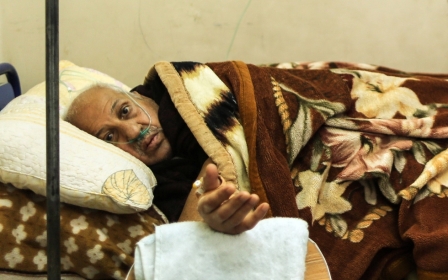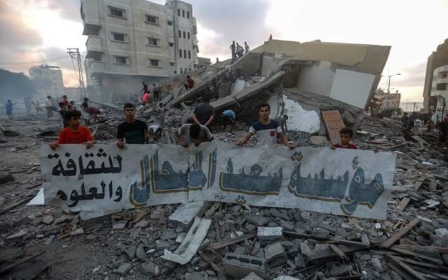Re-opening of Kerem Shalom crossing met with scepticism in Gaza
Israel's move to lift a ban on movement of commercial goods through its Kerem Shalom crossing into the Gaza strip was met with scepticism by Palestinians who spoke to Middle East Eye.
The lifting of the month-long ban on commercial goods, imposed on 9 July, comes as Israel and Hamas reportedly edged closer to a long-term ceasefire agreement.
'Portraying the opening of the crossing as an accomplishment is misleading. What Gazans need is a permanent unconditional opening of the borders'
- Mohsen Abu Ramadan, political analyst
For weeks, there have been reports and whispers of ongoing Egyptian and UN-facilitated negotiations between the two parties.
Yet while the crossing re-opening for one day was treated as a sign of Israel holding up its end of the latest deal, residents in Gaza who spoke with MEE reacted sceptically to the news.
Many of the vital materials they need – particularly medical supplies - continue to be banned, they said, while the 11-year siege continues on, regardless of closed or open crossings.
“Portraying the opening of the crossing as an accomplishment is misleading,” said Mohsen Abu Ramadan, a political analyst based in Gaza City.
“What Gazans need is a permanent unconditional opening of the borders.”
Abu Ramadan added that Israel continues to impose conditions on what goods are permitted to enter Gaza, preventing the entry of some construction and medical supplies essential for any reconstruction plan.
“The medical sector is facing the threat of collapse due to the shortage of medical supplies, banned by Israel,” he told MEE.
Kerem Shalom is on the Israeli side of north Gaza Strip and is the only commercial crossing for the two million Palestinians that live under siege.
Israel's ban-list of products to the besieged enclave included essential materials such as flour and dairy. Fuel, cement, electronic devices and clothes were recently added to the list.
“There is a long list of products banned by Israel, including for example certain cleaning products, medicines, and car spare parts,” said Nazmi Mehanna, director of the Gaza Border Crossings Authority.
This ban, he said, is permanent and not tied to any political deals.
Mohsen Abu Ramadan said the continued ban on what Israel calls “dual use materials” has indefinitely delayed any real development process in Gaza.
For 11 years, Israel has shut down all its crossings into the enclave, with the exception of the Kerem Shalom one, through which it controls the lives of 2 million Palestinians.
On Monday, the Palestinian ministry of health announced the need for urgent assistance for hundreds of cancer patients in Gaza who were unable to be administered chemotherapy due to a severe shortage of medicine and equipment.
The chairman of the Palestinian Businessmen Association, Ali Al-Hayek, has said in media statements that nearly 75,000 Palestinians have lost their businesses due to Israeli measures imposed since the 9 July ban.
New MEE newsletter: Jerusalem Dispatch
Sign up to get the latest insights and analysis on Israel-Palestine, alongside Turkey Unpacked and other MEE newsletters
Middle East Eye delivers independent and unrivalled coverage and analysis of the Middle East, North Africa and beyond. To learn more about republishing this content and the associated fees, please fill out this form. More about MEE can be found here.




